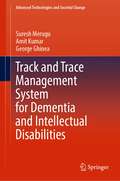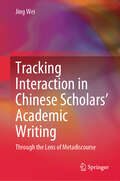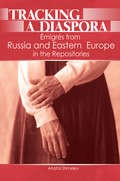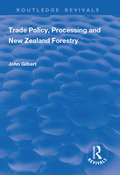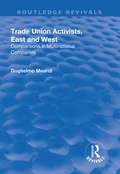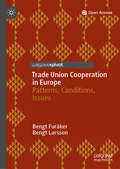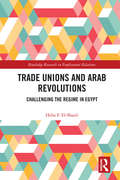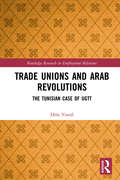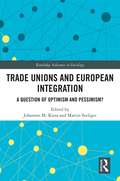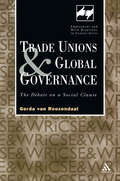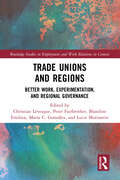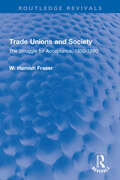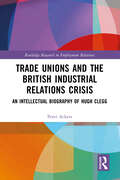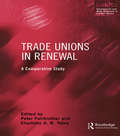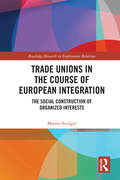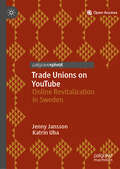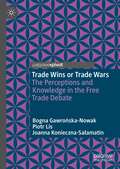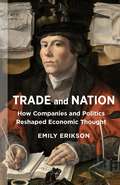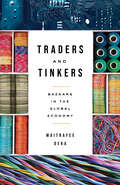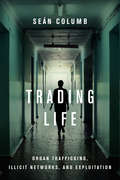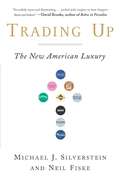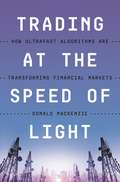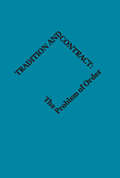- Table View
- List View
Tracing the Politicisation of the EU: The Future of Europe Debates Before and After the 2019 Elections (Palgrave Studies in European Political Sociology)
by Taru Haapala Álvaro OleartDeparting from the idea that political controversies are embedded in the very framework of European integration, this volume focuses on the relationship between politicisation and European democracy. The contributors to this edited volume trace the various ways of understanding ‘politicisation’ before and beyond the 2019 European elections. The aim is to offer constructive reinterpretations of the concept for further research in the field. Encompassing different approaches, the book shows a plurality of perspectives and provides innovative analytical tools to make sense of the phenomenon of politicisation in the EU context. Assuming that EU politicisation can be seen both as vice and virtue depending on the way in which it takes place, the authors analyse under what conditions it has a positive or negative influence over European democracy. Emphasising that scholars ought to be aware of the normative assumptions underlying the conceptualisation of politicisation, the book illustrates how many of the features in European politics that were intensified during the Covid-19 pandemic were already present earlier. Tracing the Politicisation of the EU will be of interest to students and scholars in EU Studies, Comparative Politics, Media and Communication, Political Theory and Political Sociology.
Track and Trace Management System for Dementia and Intellectual Disabilities (Advanced Technologies and Societal Change)
by Amit Kumar George Ghinea Suresh MeruguThis book reviews humanitarian literature and presents the development of low-cost track & trace management system integrated with accurate GPS location data pinging using Internet of Things (IoT). The first part relates to mobile device configuration with an embedded GPS and wireless Internet connection to transmit its current location. The second part presents web server implementation and development that receives the data, parses it, and stores it for access over the Internet. The third part discusses the user interface that allows one to visually identify the current location of the device.
Tracking Interaction in Chinese Scholars’ Academic Writing: Through the Lens of Metadiscourse
by Jing WeiThis book tracks changes in the use of metadiscourse in Chinese scholars’ English and Chinese research articles, discusses how these changes reflect changes in Chinese scholars’ interactions with their peers in China and outside China, and analyzes how Chinese scholars are responding to changes in the academic context that embrace and shape rhetorical practices in the academic world. Around the turn of the twenty-first century, the Chinese government declared the goal of “enhancing international soft power,” and one important way to achieve this goal is to promote China’s global academic influence. China has indeed made remarkable strides in terms of academic output by publishing Chinese scholars’ research papers and monographs around the world. However, “international soft power” means more than just the export of papers or books; it means connecting to and participating in the academic world. For this to happen, Chinese scholars must get to know their international counterparts, understand their rhetorical preferences, and be willing (and able) to accommodate their needs.
Tracking a Diaspora: Émigrés from Russia and Eastern Europe in the Repositories
by Anatol ShmelevDiscover collections unused by other scholars!Russian immigrants are one of the least studied of all the Slavic peoples because of meager collections development. Tracking a Diaspora: Émigrés from Russia and Eastern Europe in the Repositories offers librarians and archivists an abundance of fresh information describing previously unrealized and little-used archival collections on Russian émigrés. Some of these resources have been only recently acquired or opened to the public, providing rich new avenues of research for scholars and historians. This unique source provides access to greater breadth and depth of knowledge of Russian and Eastern European immigrants, their backgrounds, and their experiences coming to the United States.Tracking a Diaspora is not only a helpful new resource to specialists but also serves as an introduction to archival research for amateur genealogists and scholars. Chapters comprehensively describe a single repository, thorough descriptions of a single collection, or offer thematic overviews, such as the theme of German emigration from Russia. The text includes detailed notes, references, figures and tables, and photographs.Tracking a Diaspora describes largely unknown collections, including: a major group of archival collections that reveals more on these immigrants and their assimilation problems the holdings of the museum, libraries, and archives of Holy Trinity Orthodox Seminary in upstate New York the archives of the Synod of the Russian Orthodox Church Outside Russia the archives and Lembich library at The Tolstoy Foundation, Inc., New York the Archives of the Orthodox Church in America the manuscript collections at the Historical Society of Pennsylvania (HSP) materials on the immigrants who settled in the Midwest six archival collections acquired by the State Archive of the Russian Federation the André Savine collection at the University of North Carolina, Chapel Hill, North Carolina and more!Tracking a Diaspora is of great interest to librarians, archivists, specialists in Russian history, and specialists in ethnic and immigration history.
Trade Policy, Processing and New Zealand Forestry (Routledge Revivals Ser.)
by John GilbertThis title was first published in 2000: Examines core issues with respect to the effect of export restrictions, the impact on processing and welfare, the consequences of foreign ownership of the resource, and the possibility of utilizing export restrictions as a retaliatory strategy against escalating tariff structures. It also examines the impact of liberalization of processed good markets. The book employs a combination of formal general equilibrium modelling and counterfactual simulation using computable general equilibrium (CGE) tecniques, with the New Zealand forestry industry used as a case study throughout. The book makes a contribution to the literature in this field by incorporating foreign ownership into an extensive formal analysis of processing incentives, develooping a new CGE model of the New Zealand economy, utilizing this model to evaluate the costs of export restrictions, and utilizing the GTAP to provide insights into the possible effect of the APEC Early Voluntary Sector Liberalization strategy.
Trade Show Psychology (SpringerBriefs in Psychology)
by Federico AddimandoIn this book, readers are taken on an illuminating journey into the world of trade shows from a unique perspective – the psychology of both exhibitors and attendees. This comprehensive guide delves deep into the intricacies of drawing visitors to your booth and forging meaningful connections. It offers a wealth of insights into the art of engaging potential clients effectively and understanding their behavior within the bustling trade show environment. The book covers a wide array of topics, including techniques for attracting visitors to your booth, effective communication strategies, and the psychology behind booth design. From the selection of color schemes and themes that resonate with your target audience to crafting compelling messages that leave a lasting impression, this book provides practical advice for achieving trade show success. It also explores the role of technology and digital marketing in modern trade show strategies, offering a blend of timeless principles and cutting-edge approaches. Moreover, the text delves into case studies and real-world examples from successful exhibitors, showcasing their innovative methods and success stories. Whether you're a seasoned trade show veteran or a newcomer looking to make a splash, this book equips you with the knowledge and strategies needed to thrive in the competitive world of trade shows. With its engaging and informative content, 'Trade Show Psychology' is an indispensable resource for anyone seeking to maximize their impact and ROI at trade shows.
Trade Union Activists, East and West: Comparisons in Multinational Companies (Routledge Revivals)
by Guglielmo MeardiThis title was first published in 2000: This text concerns the transformation of class consciousness. It shows that differences between trade union activists from the East and West are not inherited from the past but are socially constructed, and that Eastern trade unions are "no longer" like their Western counterparts, as opposed to "not yet" like them. The study concentrates mainly on Italy and Poland, with East and West referring to concepts and perceptions rather than as a geographical concern. It discovers whether the differences in trade union consciousness are due to the meaning members give a situation or the specificity of the local work settings.
Trade Union Cooperation in Europe: Patterns, Conditions, Issues
by Bengt Larsson Bengt FuråkerThis open access book discusses transnational trade union cooperation in Europe – its forms, focuses, conditions, and obstacles. It provides an overview of existing trade union cooperation and includes detailed analyses of two specific questions: the debates on statutory minimum wages and the Posting of Workers Directive. Drawing on empirical research, the authors take a comparative approach, considering national industrial relations regimes as well as individual sectors. With the ongoing processes of integration in Europe, it has become increasingly important for unions to cooperate with regard to employers and EU institutions. The authors illustrate the interconnections between national and European industrial relations, and explore the process of European integration in labour markets. Illustrating the potential for and difficulties involved in deepening trade union cooperation across Europe, this work is a vital read for trade unionists, researchers and students interested in European trade unionism and labour markets.
Trade Unions and Arab Revolutions: Challenging the Regime in Egypt (Routledge Research in Employment Relations)
by Heba F. El-Shazli“We started the 2011 revolution and the rest of Egypt followed,” say Egyptian workers with strong conviction and passion. Egyptian independent workers’ continuous claims of contention and protest repertoires were one of several main factors leading to the January 25, 2011, uprising. After thirty-two years of a Mubarak-led authoritarian regime, massive protests began in January 2011 and forced President Mubarak to step down from his position on February 11, 2011. So, how did Egyptian workers challenge the regime and how did they become one of the factors leading to the January 2011 uprising? These workers were organized into loose networks of different independent groups that had been protesting for a decade and longer prior to January 2011. These regular protests for over a decade before 2011 challenged the Egyptian authoritarian regime. This book examines the combative role of Egyptian independent workers’ formal and informal organizations as a contentious social movement to challenge the regime. It will examine the evolving role of workers as socio-economic actors and then as political actors in very political transitions. Social movement theory (SMT) and its mechanisms and social movement unionism (SMU) will be the lenses through which this research will be presented. The methodology used will be the comparative case studies of two different movements where workers who advocated for their rights for a decade prior to January 2011 experienced significantly differing outcomes. One case study showcases the municipal real estate tax collection workers who were able to establish a successful social movement and then create an independent trade union. The second case study examines an influential group of garment and textile workers, who also developed an effective social movement, yet they were not able to take it to the next step to establish an independent union. I will explore within this research a second question: why one group of workers was able to establish an independent union while the other arguably more influential group of workers, the garment and textile workers, was not able to do so. This had an impact on the overall influence they were able to exercise over the regime in addition to their effectiveness as a social movement for change.
Trade Unions and Arab Revolutions: The Tunisian Case of UGTT (Routledge Research in Employment Relations)
by Hèla YousfiThis book traces the role of the UGTT (the Tunisian General Labour Union) during Tunisia’s 2011 revolution and the transition period that ensued – Tunisia being the Arab country where trade unionism was the strongest and most influential in shaping the outcomes of the uprising. The UGTT; From its role as the cornerstone of the nationalist movement in the colonial era, has always had a key place in Tunisian politics: not so much a labour union but as an organisation that has always linked social struggles to political and national demands. Examining the role played by the UGTT in Tunisia's revolution and more generally in the restructuring of the Tunisian political arena during the three years following the popular uprising. This book asks searching questions such as; how did UGTT interact with the popular uprising that led to the departure of Ben Ali? What was the role played by the UGTT in the "political transition" leading to the adoption on January 26, 2014 of the first democratic constitution in the country’s history? How successful was the UGTT in neutralizing the risk of self- implosion caused by the different political and social crises? And what are the challenges that the UGTT faces in the new political landscape? This volume will be of key reading interest to scholars and researchers of social movements, labour movements, organizational studies, political transitions and Arab revolutions and also likely to be of interest to practitioners especially among activists, unionists and advocates within civil society.
Trade Unions and European Integration: A Question of Optimism and Pessimism? (Routledge Advances in Sociology)
by Martin Seeliger Johannes M KiessTrade Unions and European Integration brings together pessimists and optimists on trade unionism under the contemporary pressures of European integration. The Great Recession has brought new attention to structural problems of the European integration process, specifically monetary integration; holding the potential of disabling any trans-national co-ordination. Other authors argue that the current crisis also poses the chance for mobilization and new impulses for European trade unionism. This is discussed in the volume alongside a variety of topics including bargaining coordination, co-determination, European governance regimes, and European wide mobilization. While the importance of the question of how trade unionism and wage policy can, will, and should develop under the conditions of European integration seems widely shared, the polarization of the debate itself deserves our attention to learn about the opposing arguments and points of view; and to enhance academic discussion as well as consultancy to policy makers. This volume addresses this debate by bringing together the most distinguished voices and searching for common ground as well as new perspectives on European trade unionism and collective bargaining. The chapters of the volume, organised topically, are each accompanied by a comment from a distinguished scholar, highlighting the divisions of the debate. With this innovative approach, this book advances the dialogue between what have become openly opposed camps of optimists and pessimists on the future of European integration, trade unionism and its future chances. Trade Unions and European Integration will appeal to students and researchers interested in fields such as European Studies, Industrial Relations, Political Economics, Social Movements and Sociology of Work.
Trade Unions and Global Governance: The Debate on a Social Clause (Routledge Studies in Employment and Work Relations in Context)
by Gerda van RoozendaalAs the world economy is liberalized, and national economies become more intertwined, the national decision making of states is also increasingly interdependent, and it has become vital for non-governmental organizations to create an international agenda. This title is an important study of what makes such organizations successful on an international level. The focus is on trade unions, as a key international group of NGOs. It asks whether a global system can be designed to stimulate countries to observe a set of minimum or core standards. It explores three important questions: how have unions attempted to influence the debate on the inclusion of minumum labour standards in the WTO agreement?; what accounts for their success or lack of success?; and what conclusions, with respect to the effective behaviour of trade unions in the construction of international policy, can be drawn from these experiences? In exploring these questions the text looks at social clause debates within a number of international bodies: the ILO, OECD and the EU, and within two countries: the USA and India.
Trade Unions and Regions: Better Work, Experimentation, and Regional Governance (Routledge Studies in Employment and Work Relations in Context)
by Christian LévesqueTrade Unions and Regions: Better Work, Experimentation, and Regional Governance is about the place of workers and their unions in the modern world. It addresses current challenges for unions working in regions and the experiments that may take place at this level of governance. The book addresses pressing questions concerned with the conditions for better work and a humane society. The focus is on the capacities of unions to address questions relating to regional governance, in both supranational and sub-national regions. It examines workers and their unions in a variety of contexts: multinationals, industries, workplaces, and communities. The authors address the experiments that can be initiated by unions, governments, or employers and the ways in which collective organisations engage to address these matters in regional contexts. The analysis takes as a starting point the fracturing and divisions evident in various regions, in Australia, Canada, Mexico, Spain, the United Kingdom, and USA. The contributors propose novel analyses with lessons for unions. It should be of interest to union activists and leaders, political parties, governments, and those who make decisions in and about regions. Researchers and students of labour markets, political mobilisation, and employment relations will take the analyses further.
Trade Unions and Society: The Struggle for Acceptance, 1850-1880 (Routledge Revivals)
by Hamish FraserFirst published in 1974, Trade Unions and Society examines the process by which trade unions sought and achieved recognition in the three decades after 1850. It shows a parallel process: on the one hand, trade unionists struggling to attain the indispensable Victorian virtue, ‘respectability’, without sacrificing their essentially protective functions; on the other hand, employers recognizing the value of an ordered system of industrial relation in which trade unions could exert discipline and control over their workers. While this was going on, middle-class radicals (often themselves employers) continued their attack on aristocratic domination of political institutions and looked to a ‘labour aristocracy’ as allies. The book shows the manner in which, thanks to their own efforts and those of their indefatigable publicists, unionists became identified with the respectable elite of the working class. It deals with a crucial period in the trade union development but looks at it not merely from the point of view of the unions, but also that of the employers, politicians, the press, intellectuals, political economists, giving for the first time a rounded picture of trade unionism and industrial relations in the third quarter of the nineteenth century. This book will be of interest to students of economics and history.
Trade Unions and the British Industrial Relations Crisis: An Intellectual Biography of Hugh Clegg (Routledge Research in Employment Relations)
by Peter AckersHugh Clegg was a founding figure of post-war British Industrial Relations, the forerunner of Employment Relations and Human Resource Management, as taught in most Business Schools today. He defined ‘industrial democracy’ as collective bargaining with trade unions, laid the foundations for the pluralist approach to Industrial Relations, was a key figure in the post-war social sciences and a major public policy player. More widely, he was an important figure in the Cold War social democratic academic left, who broke with his earlier Communism to champion free trade unions in a liberal democratic society. He also produced the major Oxford University Press trade union history. This book aims to understand the politics and industrial relations of the post-war period in Britain (in which trade unions were central) through the life of a key public intellectual. It will help readers understand the political and social science roots of contemporary Employment Relations and Human Resource Management through a deep historical study of Clegg’s life and times, in the context of his post-war social democratic generation. It illustrates how the failures of post-war industrial relations led to Thatcherism. Current Employment Relations academics and public policy can learn much from this history, making it of value to researchers, students, and academics in the fields of Human Resource Management and business and management history.
Trade Unions in Renewal: A Comparative Study (Routledge Studies in Employment and Work Relations in Context)
by Peter Fairbrother Charlotte A. B. YatesThis comprehensive survey of continuity and change in trade unions looks at five primarily English-speaking countries: the USA, Canada, Australia, New Zealand and the UK. The authors consider the recent re-examination by trade union movements of the basis of union organization and activity in the face of a harsher economic and political climate. One of the impetuses for this re-examination has been the recent history of unions in the USA. American models of renewal have inspired Australia, New Zealand and the UK, while Canada has undergone a cautious examination of the US model with an attempt to develop a distinctive approach. This book aims to provide a thorough grounding for informed discussion and debate about the position and place of trade unions in modern economies.
Trade Unions in the Course of European Integration: The Social Construction of Organized Interests (Routledge Research in Employment Relations)
by Martin SeeligerFrom the perspective of trade unions, European integration makes it more necessary than ever before to establish common political positions. At the same time, increasing heterogeneity between the member states makes the crafting of such positions more and more difficult. Can, under these circumstances, a joint political line among European trade unions emerge? To answer this question, the book sheds light on transnational trade union cooperation in the three most important policy fields: the debate around the Freedom of services, the discussion over a European minimum wage, and the efforts of international wage coordination. Drawing on the results of extensive field research based on a qualitative study among trade unions from Hungary, Poland, Sweden, and Germany, as well as representatives from the European level, this book points to a significant gap in European trade union politics between pretensions and reality. The findings provide a solid theoretical framework, suitable not only to explain current dynamics in the field of European trade unionism, but also promising for further research on the topic. With its focus on a contested political field, Trade Unions in the Course of European Integration contributes to practical and theoretical debates within European trade unionism. As an adequate understanding of European trade unionism in general and collective bargaining requires a twofold perspective on European integration and the role of trade unions in European labor relations, two fields of scholarly interest are being addressed. Moreover, with its focus on European trade unionism as an internationalist project of labor politics, the book will also appeal to those interested in the field of Global Labor Studies.
Trade Unions on YouTube: Online Revitalization in Sweden
by Katrin Uba Jenny JanssonThis open access book investigates how trade unions representing different social classes use YouTube videos for renewal purposes. Information and communication technology has undoubtedly offered new opportunities for social movements, but while research suggests that these new means of communication can be used for trade union revitalization, few studies have examined what unions actually do on social media. By analysing more than 4500 videos that have been uploaded by Swedish trade unions, Jansson and Uba explore how unions use YouTube to address issues such as recruiting new members, improving internal democracy, promoting political campaigns and constructing (new) self-images. The results demonstrate that trade unions representing a range of social classes use different revitalization strategies via YouTube. This research will be of use to students and scholars researching European politics and political participation, trade unionism and labour movements in the digital age.
Trade Wins or Trade Wars: The Perceptions and Knowledge in the Free Trade Debate
by Piotr Lis Bogna Gawrońska-Nowak Joanna Konieczna-SałamatinThis book tackles the disconnect between social perceptions and expert knowledge regarding trade policy decisions. Using a Polish language internet database, the authors shed light on areas that need to be addressed when considering the adoption of particular trade policies by applying content and statistical analysis to produce an easy to deploy measure of populism in digital media, the “Media Populism Ratio”. Defining a mismatch between social perception and expert knowledge may contribute to a better understanding of the controversies on free trade, as well as properly defining possible sources of populism and social conflicts – therefore also revealing some potential weaknesses in the trade policy implementation level which are at times neglected or underestimated. The book will be relevant to students and researchers interested in economic policy, economic narratives and cultural economics.
Trade and Nation: How Companies and Politics Reshaped Economic Thought (The Middle Range Series)
by Emily EriksonIn the seventeenth century, English economic theorists lost interest in the moral status of exchange and became increasingly concerned with the roots of national prosperity. This shift marked the origins of classical political economy and provided the foundation for the contemporary discipline of economics. The seventeenth-century revolution in economic thought fundamentally reshaped the way economic processes have been interpreted and understood. In Trade and Nation, Emily Erikson brings together historical, comparative, and computational methods to explain the institutional forces that brought about this transformation.Erikson pinpoints how the rise of the company form in confluence with the political marginalization of English merchants created an opening for public argumentation over economic matters. Independent merchants, who were excluded from state institutions and vast areas of trade, confronted the power and influence of crown-endorsed chartered companies. Their distance from the halls of government drove them to take their case to the public sphere. The number of merchant-authored economic texts rose as members of this class sought to show that their preferred policies would contribute to the benefit of the state and commonwealth. In doing so, they created and disseminated a new moral framework of growth, prosperity, and wealth for evaluating economic behavior. By using computational methods to document these processes, Trade and Nation provides both compelling evidence and a prototype for how methodological innovations can help to provide new insights into large-scale social processes.
Traders and Tinkers: Bazaars in the Global Economy (Culture and Economic Life)
by Maitrayee DekaThe term "tinker" calls to mind nomadic medieval vendors who operate on the fringe of formal society. Excluded from elite circles and characterized by an ability to leverage minimal resources, these tradesmen live and die by their ability to adapt their stores to the popular tastes of the day. In Delhi in the 21st century, an extensive network of informal marketplaces, or bazaars, has evolved over the course of the city's history, across colonial and postcolonial regimes. Their resilience as an economic system is the subject of this book. Today, instead of mending and selling fabrics and pots, these street vendors are primarily associated with electronic products—computers, cell phones, motherboards, and video games. This book offers a deep ethnography of three Delhi bazaars, and a cast of tinkers, traders, magicians, street performers, and hackers who work there. It is an exploration, and recognition, of the role of bazaars and tinkers in the modern global economy, driving globalization from below. In Delhi, and across the world, these street markets work to create a new information society, as the global popular classes aspire to elite consumer goods they cannot afford except in counterfeit.
Trading Life: Organ Trafficking, Illicit Networks, and Exploitation
by Seán ColumbThis groundbreaking book investigates the emergence and evolution of the organ trade across North Africa and Europe. Seán Columb illuminates the voices and perspectives of organ sellers and brokers to demonstrate how crime and immigration controls produce circumstances where the business of selling organs has become a feature of economic survival. Drawing on the experiences of African migrants, Trading Life brings together five years of fieldwork charting the development of the organ trade from an informal economic activity into a structured criminal network operating within and between Egypt, Libya, Sudan, Eritrea, and Europe. Ground-level analysis provides new insight into the operation of organ trading networks and the impact of current legal and policy measures in response to the organ trade. Columb reveals how investing financial and administrative resources into law enforcement and border securitization at the expense of social services has led to the convergence of illicit smuggling and organ trading networks and the development of organized crime. Trading Life delivers a powerful and grounded analysis of how economic pressures and the demands of survival force people into exploitative arrangements, like selling a kidney, that they would otherwise avoid. This fascinating and accessible book is a must-read for anyone interested in migration, organized crime, and exploitation.
Trading Up: The New American Luxury
by Michael Silverstein Neil FiskeA fascinating look at why millions of consumers are "trading up" to premium goods, and how companies can profit from this phenomenon. Middle-market consumers have more discretionary income than ever before and are willing to pay extra for "new luxury" goods and services-items that deliver higher quality, technical advantages, and superior performance to conventional products. Above all, consumers are looking for emotional engagement-they look to products to help them manage the stresses of everyday life, and to help them realize their aspirations. A new luxury good may be as simple as a shampoo ($9 from Aveda, versus $3 from Suave) that brings moments of comfort and sensual pleasure, or as complex as a car ($26,000 for a bottom-of-the-line Mercedes, versus $20,000 for a Pontiac) that delivers feelings of safety and excitement. Clothing, cars, beer, coffee, kitchen appliances, lingerie, personal care, pet food, restaurants-in dozens of categories, new luxury goods occupy a sweet spot in the market, because they can sell in much higher unit volumes than "old luxury" goods, but command much higher profit margins than ordinary products. But new luxury leaders-such as Callaway Golf, Victoria's Secret, Panera Bread, Belvedere vodka, Whirlpool Duet, and Williams-Sonoma-create andmarket their goods very differently than do conventional companies. Trading Upexplores what's driving this move to premium goods, tells the inside stories of many New Luxury companies and their leaders, and offers insights and methods that can help the reader take advantage of this remarkable phenomenon. The book is based on the authors' experience in helping clients create billions of dollars worth of New Luxury products as well as on exhaustive supporting research.
Trading at the Speed of Light: How Ultrafast Algorithms Are Transforming Financial Markets
by Donald MacKenzieA remarkable look at how the growth, technology, and politics of high-frequency trading have altered global financial marketsIn today’s financial markets, trading floors on which brokers buy and sell shares face-to-face have increasingly been replaced by lightning-fast electronic systems that use algorithms to execute astounding volumes of transactions. Trading at the Speed of Light tells the story of this epic transformation. Donald MacKenzie shows how in the 1990s, in what were then the disreputable margins of the US financial system, a new approach to trading—automated high-frequency trading or HFT—began and then spread throughout the world. HFT has brought new efficiency to global trading, but has also created an unrelenting race for speed, leading to a systematic, subterranean battle among HFT algorithms.In HFT, time is measured in nanoseconds (billionths of a second), and in a nanosecond the fastest possible signal—light in a vacuum—can travel only thirty centimeters, or roughly a foot. That makes HFT exquisitely sensitive to the length and transmission capacity of the cables connecting computer servers to the exchanges’ systems and to the location of the microwave towers that carry signals between computer datacenters. Drawing from more than 300 interviews with high-frequency traders, the people who supply them with technological and communication capabilities, exchange staff, regulators, and many others, MacKenzie reveals the extraordinary efforts expended to speed up every aspect of trading. He looks at how in some markets big banks have fought off the challenge from HFT firms, and how exchanges sometimes engineer technical systems to favor certain types of algorithms over others.Focusing on the material, political, and economic characteristics of high-frequency trading, Trading at the Speed of Light offers a unique glimpse into its influence on global finance and where it could lead us in the future.
Tradition and Contract: The Problem of Social Order
by A. James GregorFirst Published in 2017. Routledge is an imprint of Taylor & Francis, an Informa company.

